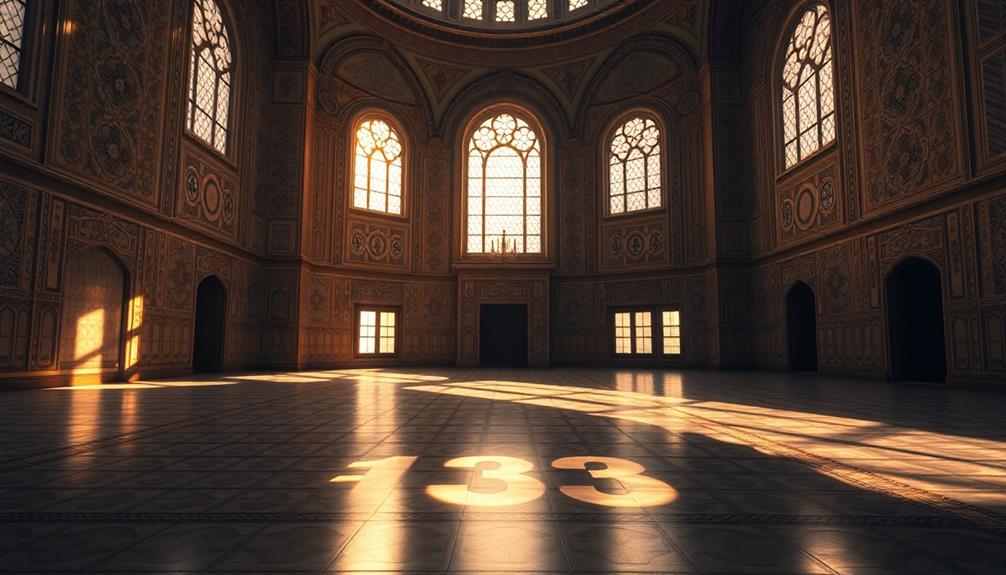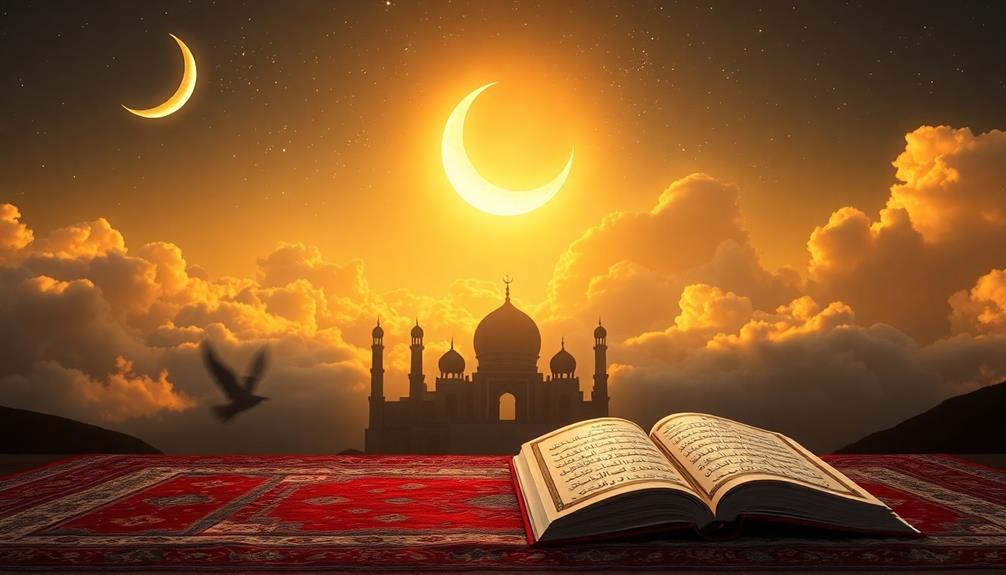Angel numbers are generally considered haram in Islam because they can lead you to rely on superstition rather than on Allah. The concept comes from New Age spirituality and lacks grounding in Islamic teachings. Engaging with angel numbers might distract you from seeking guidance through prayer and the Quran, which are essential for true spiritual connection. Additionally, attributing divine significance to numbers risks leading to shirk, a serious transgression in Islam. Understanding the diverse opinions on this topic can help clarify your beliefs and strengthen your faith. There's more to uncover about this interesting debate ahead.
Key Takeaways
- Angel numbers are viewed as superstitions in Islam, distracting believers from reliance on Allah for guidance.
- Engaging with angel numbers risks leading to shirk, as it associates divine significance with numerical interpretations.
- True spiritual guidance in Islam comes from prayer and the teachings of the Quran, not from numerology.
- Reliance on angel numbers undermines the concept of Allah's omniscience and control over one's life.
- Islamic teachings prioritize a direct relationship with Allah, discouraging distractions from authentic faith practices.
Definition of Angel Numbers

Many people encounter sequences of numbers that seem to appear with unusual frequency, known as angel numbers. These repetitive digits, typically three or four in length, are believed to convey spiritual messages or guidance from the divine domain.
Angel numbers represent a way for your guardian angels or higher powers to communicate with you, offering insights into your life's path. Each angel number carries specific meanings. For instance, 111 often signifies new beginnings, urging you to embrace change and take the first step toward your goals.
Meanwhile, 222 symbolizes alignment, indicating that you're on the right path and encouraging you to trust your intuition. The appeal of angel numbers lies in their personal significance. Many people find comfort in interpreting these sequences, viewing them as signs that they're supported by a higher force.
The concept of angel numbers is particularly popular in New Age beliefs and numerology, where individuals often seek patterns and meanings in their everyday lives. However, it's crucial to acknowledge that interpretations can vary widely across cultures, with some finding deep personal relevance in these numerical sequences.
Islamic Views on Numerology

Islamic views on numerology are generally negative, as it's often associated with practices considered haram, such as magic and superstition. In Islam, reliance on Allah is paramount, and attributing significance to numbers can be seen as a distraction from this core belief. Engaging in numerology is viewed as potentially leading to shirk, which is associating partners with Allah.
| Aspect | Numerology | Islamic Perspective |
|---|---|---|
| Belief | Numbers influence fate | Allah controls destiny |
| Practice | Superstition and magic | Reliance on authentic sources |
| Outcome | Misguided focus | Strengthened faith |
While certain Islamic rituals involve specific numbers, such as odd quantities, these practices are fundamentally different from numerological beliefs. Instead of chasing numerical interpretations, Muslims are encouraged to seek knowledge from authentic Islamic teachings. Ultimately, the consensus is clear: numerology is haram and should not divert your focus from the singular reliance on Allah and the principles of Islam.
Superstition and Shirk Explained

When you engage with angel numbers, you might unknowingly step into the domain of superstition, which Islam strongly warns against.
This reliance on numbers for guidance can lead to shirk, as it suggests that you're placing trust in something other than Allah.
It's essential to remember that true guidance comes from prayer and the teachings of the Quran, not from numerological interpretations.
Superstitions in Islamic Beliefs
Understanding superstitions in Islamic beliefs reveals a critical aspect of faith that emphasizes reliance solely on Allah. During the Jahiliyyah period, many people relied on omens and signs, but Islam came to rectify this mindset. Engaging in superstitions, like believing in the power of specific numbers or omens, can lead you away from true faith and potentially into shirk, which is associating partners with Allah—a serious violation in Islam.
Islamic teachings clearly discourage reliance on fortune-telling, horoscopes, or any form of divination that claims to predict the future, as these practices undermine the belief in Allah's complete control over all affairs. Instead, the Quran and Sunnah guide you to seek knowledge and guidance directly from divine sources.
Misinterpretations of numbers and their supposed significance can create confusion about Islamic beliefs. It's crucial to adhere to authentic teachings and avoid pseudo-scientific practices. By doing this, you strengthen your faith and maintain a clear understanding of Islam's core tenets, ensuring that your reliance remains solely on Allah rather than falling into the trap of superstitions.
Risk of Shirk
Misplaced faith in angel numbers poses a significant risk of shirk, as it encourages individuals to rely on numerical interpretations for guidance instead of turning to Allah. When you start attributing meaning to specific numbers, you risk associating partners with Allah, which contradicts the core tenets of Islam. Superstitions regarding numbers detract from the belief that Allah controls all affairs, fostering misguided faith practices.
Engaging with angel numbers can lead to a reliance on numerology, a practice often seen as a form of magic. This reliance is considered haram because it diverts you from authentic Islamic teachings. Historical context shows that Islam aims to eliminate superstitions from the Jahiliyyah period, emphasizing direct communication with Allah and discouraging interpretations based on signs or numbers.
When you consult angel numbers, you may inadvertently neglect the importance of prayer and the Quran. Authentic guidance comes from these sources, which are essential for your spiritual growth and understanding.
Historical Context of Angel Numbers

Angel numbers have their origins in the late 20th century, especially within New Age spirituality, where they're seen as messages from spiritual guides.
Over time, different cultures have interpreted these number sequences in various ways, often linking them to personal journeys or auspicious signs.
However, it's essential to recognize that the term "angel numbers" isn't grounded in historical religious texts, raising questions about their validity in traditional beliefs.
Origins of Angel Numbers
While many people today associate certain number sequences with spiritual guidance, the origins of these angel numbers can be traced back to various cultural and spiritual beliefs. You'll find that angel numbers gained traction in New Age practices, where sequences like 111 or 333 are thought to convey messages from the spiritual domain. The term "angel numbers" surged in popularity during the late 20th century, fueled by books and online resources promoting these sequences as signs of support from guardian angels.
Consider the historical context:
- Ancient civilizations like the Babylonians and Greeks laid the groundwork for the mystical significance of numbers.
- Numerology has been a key influence on modern interpretations of angel numbers.
- The rise of social media has amplified the sharing of personal experiences regarding these numbers.
- Despite their popularity, angel numbers aren't rooted in Islamic tradition or scripture.
- This lack of traditional backing has led to debates about whether angel numbers are haram in Islam.
As you explore this topic, it's crucial to understand these origins to grasp the current discussions surrounding angel numbers.
Cultural Interpretations Over Time
The fascination with numbers has evolved considerably over time, influenced by cultural interpretations and spiritual beliefs. In the late 20th century, angel numbers emerged as a popular concept within New Age movements, seen as messages from guardian angels or divine entities.
However, this interpretation starkly contrasts with Islamic teachings that emphasize a direct relationship with Allah.
Historically, cultures have assigned specific meanings to numbers; for example, the number seven holds significance in both ancient and Islamic traditions, symbolizing completeness and perfection.
In the context of Islamic history, the Jahiliyyah period was marked by superstitions, including numerology and idol worship. The teachings of Islam aimed to rectify these beliefs, discouraging practices that could lead to shirk, or associating partners with Allah.
Despite the allure of angel numbers today, Islamic scholars argue that these beliefs deviate from the core principles of faith established in the Quran and Sunnah.
They stress that relying on such numerical interpretations can distract you from the essence of worship and the direct communication with Allah, ultimately labeling the practice as haram.
Specific Angel Numbers Analyzed

Examining specific angel numbers reveals a mix of interpretations and beliefs that can both intrigue and confuse. Each number carries its own significance, which might resonate with you or challenge your views on spirituality, particularly within an Islamic context.
- 786: Often linked to Allah's name, seen as a symbol of luck and prosperity, but criticized by orthodox Muslims for promoting superstition.
- 444: Represents reassurance and protection, encouraging you to trust your inner strength during difficult times.
- 1122: Viewed as a prophetic signal of new beginnings and opportunities, motivating you to take action.
- 555: Indicates positive change, urging you to embrace spiritual growth and forward movement in your life.
- 777: Symbolizes divine perfection, while 2117 suggests growth and a passion for learning, although these interpretations can clash with Islamic teachings.
While these angel numbers can offer comfort and guidance, it's crucial to navigate their meanings critically, especially within the framework of Islamic beliefs.
Balancing personal insights with religious perspectives can help you understand their place in your spiritual journey.
Cultural Interpretations of Numbers

Numbers carry different meanings across cultures, and you might notice how certain numbers are viewed as lucky or significant in various traditions.
For instance, while 786 holds special importance in some communities, others may see sequences like 222 as positive signs.
This blend of cultural beliefs can sometimes lead to misunderstandings about their true relevance in Islamic teachings.
Cultural Significance of Numbers
In many cultures, numbers carry deep meanings and significance beyond their quantitative value. You might be surprised by how different societies interpret numbers, infusing them with cultural significance that shapes beliefs and practices.
For instance, the number 7 symbolizes completeness in Islamic tradition, as seen in the ritual of circling the Kaaba seven times during Hajj. Additionally, the enduring love and legacy of family, much like the significance of numbers, can shape our lives in profound ways, as highlighted in a mother's enduring love.
222 often represents being on the right path, reflecting a belief in receiving divine guidance. 786 is linked to good fortune and the phrase "Bismillah," although this association can be controversial among orthodox Muslims.
In various cultures, 3 signifies balance and harmony, frequently appearing in Islamic rituals like ablutions. The number 444 is seen as a symbol of reassurance and protection on personal journeys.
These examples showcase the cultural significance of numbers and how they resonate with spiritual meanings across different traditions. They reveal a fascinating tapestry of beliefs that can influence how individuals perceive their reality and navigate their lives.
Diverse Beliefs and Practices
Exploring the diverse beliefs surrounding numbers reveals a rich tapestry of interpretations that vary across cultures. For instance, some cultures see sequences like 222 as a sign of being on the right path, while others dismiss them as mere coincidences.
In Islamic tradition, certain numbers, particularly 7, carry significant cultural and religious weight, often linked to rituals and spiritual practices. Additionally, the use of essential oils for various health benefits reflects how cultural beliefs can shape our understanding of wellness, similar to how essential oils for dizziness relief are embraced in certain communities.
The concept of angel numbers has gained traction among various spiritual communities, leading to a multitude of personal meanings attached to these sequences. You might find that some individuals derive comfort from angel numbers, viewing them as signs of guidance from higher powers.
However, this perspective often contrasts with traditional Islamic teachings, which may not endorse such interpretations. If you're curious about how these beliefs intersect, you might come across an Islamic video that explains these cultural nuances.
Misunderstandings can easily arise when blending cultural beliefs with spiritual practices, which can lead to confusion about their actual significance in Islam. Embracing the diversity of interpretations surrounding numbers can enrich your understanding of both cultural and spiritual dimensions.
Misinterpretation in Communities
While many people find comfort in assigning meanings to numbers, this practice can lead to misunderstandings within Islamic communities. When you look at how certain numbers are interpreted, you might notice that these beliefs often clash with Islamic teachings. Misinterpretation can divert focus from true faith, creating confusion that distances you from essential Islamic principles.
- Many view 222 as a sign of being on the right path, overshadowing reliance on Allah.
- Cultural beliefs attribute meanings, like 786 symbolizing Allah's name, which some Muslims view as superstition.
- The rise of "angel numbers" adds to the confusion, muddling personal beliefs with Islamic values.
- Misinterpretation distracts from numbers' actual significance in Islamic practices, which is rooted in faith, not mysticism.
- The blend of cultural interpretations and personal beliefs can lead to divergence from authentic Islamic teachings.
To navigate these complexities, it's vital to seek clarity and guidance from trusted scholars. By doing so, you can guarantee your understanding aligns with Islamic principles and avoid the pitfalls of misinterpretation.
Islamic Practices and Rituals

Islamic practices and rituals are deeply rooted in the traditions established by the Prophet Muhammad and his companions. These rituals often involve specific actions performed a set number of times, reinforcing the significance of odd numbers. For instance, ablution (wudhoo) is recommended to be done three times, following the practice of Uthman bin Affan. Similarly, during Hajj, pilgrims circle the Kaaba seven times, highlighting the importance of this number in worship.
Here's how some common practices align with Islamic teachings:
| Practice | Significance | Halal/Haram |
|---|---|---|
| Ablution (Wudhoo) | Purification | Halal |
| Tawaf | Ritual of Hajj | Halal |
| Odd Number Worship | Emphasized in Hadith | Halal |
While these numbers are integral to worship, they aren't tied to numerology or superstitions. Engaging in practices like angel numbers diverges from the core principles of Islam and may lead to misunderstandings. It is crucial to adhere strictly to the traditions prescribed by the Prophet, ensuring that your practices remain within the scope of what is Halal and avoid anything considered Haram.
The Role of Divine Guidance

In seeking divine guidance, you'll find that Islam emphasizes turning to prayer (dua) and the teachings of the Quran and Sunnah rather than relying on numerology or symbols. This approach strengthens your connection with Allah and helps you navigate life's challenges with clarity.
Consider these key points about divine guidance in Islam:
- Trust in Allah (Tawakkul): Reliance on Allah is fundamental and encourages you to seek His help directly.
- Knowledge of the Unseen: Only Allah knows the future; consequently, relying on angel numbers can lead to misguided beliefs.
- Avoiding Superstitions: Engaging with numerology can divert your focus from authentic Islamic teachings and practices.
- Preventing Shirk: Attributing divine significance to numbers may risk associating partners with Allah, which contradicts Islamic principles.
- Fostering Spiritual Growth: Engaging with the Quran and Sunnah promotes a deeper understanding of your faith and encourages personal development.
Community Perspectives on Beliefs

Many in the community are intrigued by the concept of angel numbers and often seek to understand their significance within an Islamic framework. This curiosity leads to a variety of opinions, reflecting a division among community members. Some find solace in these numbers, believing they carry divine messages, while others firmly reject this notion, adhering strictly to Islamic teachings.
| Perspective | Description |
|---|---|
| Supportive of Angel Numbers | View them as comforting signs from the divine. |
| Skeptical of Angel Numbers | Concerned about potential superstition and shirk. |
| Imam Al-Khoei Foundation's View | Encourages discussion but emphasizes Islamic teachings. |
| Community Division | Differences in interpretation and reliance on Allah. |
| Need for Education | Highlighting the distinction between culture and faith. |
This division emphasizes the importance of awareness and education regarding the interpretation of numbers in Islam. The belief in angel numbers, while comforting to some, raises questions about adherence to faith. Engaging in open discussions within the community can help navigate this complex topic while reinforcing the core Islamic principles.
Navigating Spirituality and Faith

Steering spirituality and faith in the context of angel numbers can be challenging for many individuals. You might find yourself torn between seeking guidance through these numbers and adhering to Islamic principles. It's crucial to focus on authentic teachings and avoid potential pitfalls that could lead to confusion or shirk.
Consider these points as you navigate your spirituality:
- Rely on direct prayer to seek guidance from Allah.
- Understand that the Quran and Sunnah provide the foundation for Islamic faith.
- Recognize that angel numbers may lead to superstitions, which can distract from true spirituality.
- Emphasize knowledge and faith over numerological interpretations.
- Maintain a direct relationship with Allah, prioritizing His guidance above all.
In Islam, the belief in angel numbers is often viewed skeptically. Scholars warn that relying on them could undermine your faith and lead you away from the vital teachings of Islam.
Frequently Asked Questions
Are Angel Numbers Haram in Islam?
You might wonder if angel numbers are haram in Islam.
Many scholars argue that they are, as believing in these numbers can lead to superstitions that deviate from the core tenet of monotheism. Engaging with angel numbers might tempt you to predict the future, which contradicts Islamic teachings.
Instead of seeking signs, it's encouraged to rely on direct communication with Allah through prayer and faith, steering clear of any form of superstition.
Is It a Sin to Believe in Angel Numbers?
Believing in angel numbers can lead you to rely on superstitions instead of trusting in Allah's guidance.
While some might find personal meaning in these numbers, it's important to focus on direct communication with Allah through prayer.
Engaging with numerology may divert you from authentic beliefs and potentially lead to misunderstandings about faith.
Instead, seek knowledge and guidance from trusted sources to strengthen your connection with God.
Is Numerology Haram in Islam?
Imagine believing that numbers hold the key to your destiny—it's a magical thought!
However, when you explore numerology, you might unknowingly stray from your faith.
Islam teaches that seeking knowledge of the unseen through numbers can lead to confusion and distract you from relying solely on Allah.
Engaging in numerology could pull you away from the clarity found in the Quran and Sunnah, making it a practice that's generally considered haram.
What Does 777 Mean in Islam?
In Islam, the number 777 doesn't hold a specific meaning.
Instead, you'll find that the number 7 is significant, symbolizing completion and perfection.
It's evident in rituals like Tawaf and teachings about charity for the deceased.
While some may associate 777 with angel numbers or numerology, traditional Islamic beliefs focus on the established significance of the number 7 in religious practices and values, rather than any mystical interpretations.
Conclusion
So, are angel numbers haram? Well, unless your calculator suddenly starts preaching, you might want to tread carefully. Islam encourages seeking divine guidance, not deciphering secret codes from the universe. But hey, if you feel led to count the stars or interpret your grocery list as a divine sign, who are we to stop you? Just remember, faith isn't about numbers—unless you're counting blessings, of course! Now, go forth and ponder your digits wisely.









